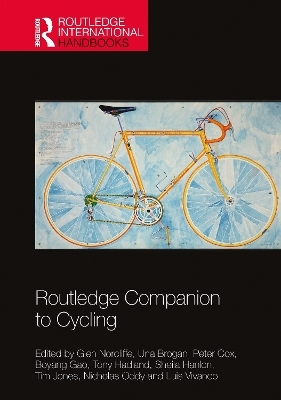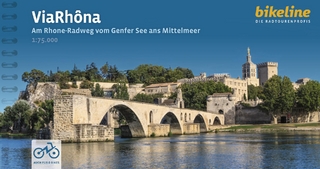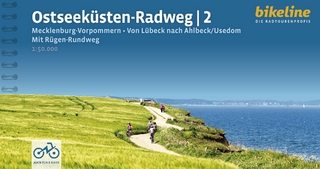
Routledge Companion to Cycling
Routledge (Verlag)
978-0-367-69508-8 (ISBN)
Routledge Companion to Cycling presents a comprehensive overview of an artefact that throughout the modern era has been a bellwether indicator of the major social, economic and environmental trends that have permeated society The volume synthesizes a rapidly growing body of research on the bicycle, its past and present uses, its technological evolution, its use in diverse geographical settings, its aesthetics and its deployment in art and literature. From its origins in early modern carriage technology in Germany, it has generated what is now a vast, multi-disciplinary literature encompassing a wide range of issues in countries throughout the world.
Glen Norcliffe is an Emeritus Professor of Geography at York University, Canada. Una Brogan is a translator and independent researcher from Northern Ireland, UK. Peter Cox is a Professor of Sociology at the University of Chester, UK. Boyang Gao is Professor of Urban and Real Estate Management, Central University of Finance and Economics, Beijing. Tony Hadland is a Chartered Building Surveyor and historian living in Oxfordshire, UK. Sheila Hanlon is a historian specialising in the history of women’s cycling works with a number of organizations such as Cycling UK and the Cycling History Education Trust. Tim Jones is Reader in Urban Mobility in the School of the Built Environment at Oxford Brookes University, UK. Nicholas Oddy is Head of Department of Design History & Theory at Glasgow School of Art, UK. Luis Vivanco is Professor of Anthropology and Director of the Humanities Center at the University of Vermont, USA.
An Introduction to The Companion to Cycling
Section 1: Cycling and Society: An Introduction
Introduction to Section 1
1. Theorising Cycling
2. Cycling and Gender: Past, Present and Paths Ahead
3. The Precarious Work of Platform Cycle Delivery Workers
4. The Sociality of Cycling
Vignette A: Black Cyclists Matter: Major Taylor – Au Parc des Princes 1901.
5. Programs for Cycling Inclusion
6. The Potential of "Bike-like" Vehicles to Provide Big Wins for Climate Change,
Safety and Justice
7. Mobility, Freedom and Self-determination: The Benefits (and Barriers) to
Disabled People Cycling
Section 2: Cycle Technology
Introduction to Section 2
8. Configurations of Cycles
9. Frames and materials
10. Wheels and Shock Absorption
11. Transmission and Brakes
12. Passenger Carrying
Vignette B: Micromobility in Rwanda
13. Cycling Technologies and Disability
Section 3: The Cycling Economy: An Introduction
Introduction to Section 3
14. The Global Bicycle Industry
15. The Value Chains and Production Clusters of Taiwan’s Bicycle Industry
16. Bicycle Trade Shows as Transactional Spaces
17. Retailing Bicycles
18. On the Shoulders of Giant: Cluster Innovation and Entrepreneurship in the Taiwanese Bicycle Industry
19. Street Trades and Work Cycles
Vignette C: Mobile cycle repairing in Beijing
SECTION 4: URBAN CYCLING: An Introduction
Introduction to Section 4
20. Cycling Infrastructure: Planning Cycle Networks
Vignette D: Cycling infrastructure in Lund, Sweden
21. Situating the Mobility Fix of Contemporary Urban Cycling Policy
22. Making Space for Cycling
Vignette E: B2W Indonesia and the re-cycling of Jakarta:
Purwanto Setiani
23. Shared Micromobility: Policy, Practices, and Emerging Futures
24. E-bikes: Expanding the Practice of Cycling?
25. Cycling Safety as Mobility Justice
Section 5: Sport Cycling, Health and Lifestyles: An Introduction
Introduction to Section 5
26. Amateur Sport Cycling: The Rise of the MAMIL.
27. Professional Road Cycling
Vignette F: In the peloton
28. Off-road Cycling
29. Track Cycling
Vignette G: Keirin culture
30. Health Benefits of Cycling
31. Doping in Cycling: Past, Present and Future Trends
SECTION 6: PLACES OF CYCLING: An Introduction
Introduction to Section 6
Vignette H: Early Cycling in the Bois de Boulogne, Paris.
32. Cycling’s Symphony of Place
Vignette I: Constructing peaceful places through bicycles
33. In Quest of Adventures
Vignette J: Winter cycling: Montreal’s four-season bicycle network
34. The Africanized Bicycle
Vignette K: The Devil’s Chariot: women cycling in the Middle East
35. Cycling in Indian Cities: Between Everyday Cyclists and Affluent Cyclists
36. The Rise the "Kingdom of Bicycles"
37. Copenhagen is a good place to bike – but it could be better…
Vignette L: Beach Road, Melbourne
38. Bogotá: Perspectives on the "World bike capital"
Section 7: The Visual Culture of Cycling
Introduction to Section 7
39. The Machine Aesthetic: The Visual Identity of the Bicycle and Its
Representation in Advertising and Artefacts
40. Dressed to Ride
41. Cycle Posters of The Belle Époque:
42. Art and the Cycle
Vignette M: The space between
43. Cycling and Cinema: Revolutionary Films
Section 8: Cycling in Literature: An Introduction
Introduction to Section 8
44. The Bicycle and the Creative Pursuit in French Literature
45. The Liberating Bicycle in Literature
46. Cycling humor in turn-of-the-century literature
47. On Bards on Bicycles: The Art of Cycling Poetry
48. "The stutter of the world beneath you": The Literature of Cycle Travel
| Erscheinungsdatum | 17.08.2022 |
|---|---|
| Reihe/Serie | Routledge International Handbooks |
| Zusatzinfo | 12 Tables, black and white; 11 Line drawings, black and white; 50 Halftones, black and white; 61 Illustrations, black and white |
| Verlagsort | London |
| Sprache | englisch |
| Maße | 174 x 246 mm |
| Gewicht | 980 g |
| Themenwelt | Sachbuch/Ratgeber ► Sport ► Motor- / Rad- / Flugsport |
| ISBN-10 | 0-367-69508-1 / 0367695081 |
| ISBN-13 | 978-0-367-69508-8 / 9780367695088 |
| Zustand | Neuware |
| Haben Sie eine Frage zum Produkt? |
aus dem Bereich


